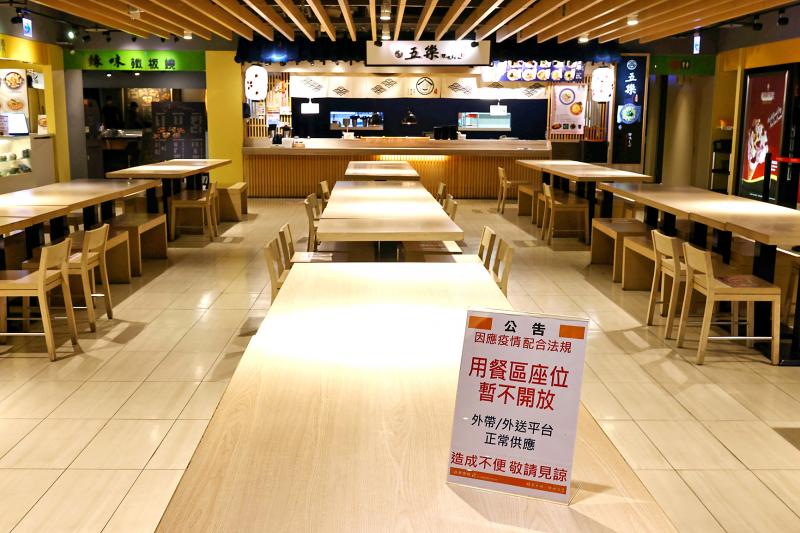Business sentiment among local manufacturers improved slightly last month, as tech and non-tech firms were upbeat about business going forward, but textile product makers turned conservative, a Taiwan Institute of Economic Research (TIER, 台灣經濟研究院) survey showed yesterday.
Confidence declined in the service and real-estate sectors, and is bound to drop further this month as the COVID-19 outbreak has escalated, reducing economic activity, the Taipei-based think tank said.
The sentiment gauge for the manufacturing industry last month registered 106.37 — a fractional 0.69 increase from a revised score of 105.68 in March, it said.

Photo: Ann Wang, Reuters
It said that 39.6 percent of firms had an optimistic outlook regarding the coming six months, a drop of 3.1 percentage points from a month earlier, while 7.9 percent of firms held a negative view, an increase of 1.2 percentage points, the think tank said.
The remainder were neutral.
Suppliers of electronics, machinery equipment, and steel and chemical products were expecting business to improve in the next six months, but textile product makers forecast a downturn, the think tank said.
The manufacturing sector has benefited from inventory-building demand from clients abroad amid expectations of a global economic recovery from the COVID-19 pandemic, TIER said.
Sectors dependent on domestic demand had a different outlook. The sentiment reading for the service sector stood at 101.47, dropping 1.06 points from a revised 101.47 in March, the institute said.
A majority of retailers, restaurants and telecoms were braced for a decline in business, and their hunch is likely to prove well-founded as authorities on Wednesday last week raised the COVID-19 alert to level 3 nationwide, TIER president Chang Chien-yi (張建一) said.
The drop in customers would wreak havoc on retailers, restaurants, hotels and recreational facilities, Chang said.
Civil engineering firms, and property developers and brokers would also fare poorly after reporting a slight decline in business last month, he said.
The confidence reading for the construction and property sectors dropped a slight 0.59 points to 106.01, declining for a second straight month after policy measures were implemented to cool the property market, the institute said.
Strict social distancing requirements would make it more difficult to find workers for infrastructure and property development projects, Chang said, adding that delays would be inevitable.
Meanwhile, interest in property purchases would slump as people are avoiding going out, TIER said.

To many, Tatu City on the outskirts of Nairobi looks like a success. The first city entirely built by a private company to be operational in east Africa, with about 25,000 people living and working there, it accounts for about two-thirds of all foreign investment in Kenya. Its low-tax status has attracted more than 100 businesses including Heineken, coffee brand Dormans, and the biggest call-center and cold-chain transport firms in the region. However, to some local politicians, Tatu City has looked more like a target for extortion. A parade of governors have demanded land worth millions of dollars in exchange

An Indonesian animated movie is smashing regional box office records and could be set for wider success as it prepares to open beyond the Southeast Asian archipelago’s silver screens. Jumbo — a film based on the adventures of main character, Don, a large orphaned Indonesian boy facing bullying at school — last month became the highest-grossing Southeast Asian animated film, raking in more than US$8 million. Released at the end of March to coincide with the Eid holidays after the Islamic fasting month of Ramadan, the movie has hit 8 million ticket sales, the third-highest in Indonesian cinema history, Film

Taiwan Semiconductor Manufacturing Co’s (TSMC, 台積電) revenue jumped 48 percent last month, underscoring how electronics firms scrambled to acquire essential components before global tariffs took effect. The main chipmaker for Apple Inc and Nvidia Corp reported monthly sales of NT$349.6 billion (US$11.6 billion). That compares with the average analysts’ estimate for a 38 percent rise in second-quarter revenue. US President Donald Trump’s trade war is prompting economists to retool GDP forecasts worldwide, casting doubt over the outlook for everything from iPhone demand to computing and datacenter construction. However, TSMC — a barometer for global tech spending given its central role in the

Alchip Technologies Ltd (世芯), an application-specific integrated circuit (ASIC) designer specializing in server chips, expects revenue to decline this year due to sagging demand for 5-nanometer artificial intelligence (AI) chips from a North America-based major customer, a company executive said yesterday. That would be the first contraction in revenue for Alchip as it has been enjoying strong revenue growth over the past few years, benefiting from cloud-service providers’ moves to reduce dependence on Nvidia Corp’s expensive AI chips by building their own AI accelerator by outsourcing chip design. The 5-nanometer chip was supposed to be a new growth engine as the lifecycle